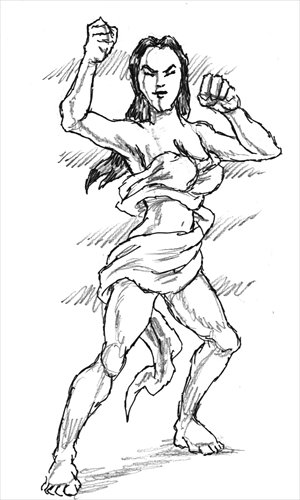HOME >> OP-ED
Radical protests fuel reactionary attitudes
By Fu Qiang Source:Global Times Published: 2012-6-29 23:29:00

Last week, the official Weibo account of Shanghai No. 2 Subway Co. posted a snapshot of a girl in a black semi-transparent dress waiting for the subway and commented that, "no wonder you'll be sexually harassed; too many perverts are riding the subway everyday and the subway administrative organization is not able to cope with this. Please respect yourself and dress properly."
Many people, especially women, found it rather offensive for an official organization to take such a victim-blaming attitude. Experts have commented that the Shanghai metro's tone is overtly patriarchal, and deeply inappropriate for an organization that's supposed to take responsibility for everyone's security, regardless of what clothes they choose to wear.
Social discussion on women's clothing in public places has grown heated. On June 24, two women staged some "performance art" on the metro to protest the Shanghai metro post. They wore black veils like traditional Muslim women, and held signs which read, "We want coolness, not perverts," and "I can be slutty, but you can't be dirty."
This time, many netizens did not agree with their behavior and believed they had gone too far. Most people agreed that women should be careful about harassment and pay more attention to dressing "appropriately" in public places, despite the existence of numerous studies showing that how women dress does not affect their chances of being targeted by sexual predators.
Some people even bizarrely argued that women who wear revealing outfits in public are actually sexually harassing the men who can see them.
Feminist theorists would classify this as a typical example of "rape culture," the attitudes and double standards that encourage sexual harassment and assault. But rather than being merely reactionary, it can also been seen as an expression of a typically Chinese attitude toward public behavior.
Admittedly, it's possible that the group of netizens reacting to the counter-demonstration were different people from those who initially criticized the subway's reactionary and sexist attitudes.
Most of the Chinese public are open to being influenced by feminist ideas and recognize the value of women's rights. But the influence of Confucian tradition, which values reticence and disdains going against the norm, means that people tend to take a critical attitude toward radical forms of protest.
The sharp contrast in public opinion toward the former and latter issues has shown that segments of public opinion remain critical of radical protests.
The prevalence of social media has meant both that people have to think twice before criticizing other groups, and that people have become more vehement and expressive about fighting for the rights they deserve. This seemingly contradictory phenomenon can actually be regarded as a form of progress.
A voluntary cultural awareness has kept the Chinese public from going too far in either side and will probably lead the public to form rational, critical attitudes toward many events in the future.
Women's rights and the feminist movement have been and continue to be a critical part of creating an open and fair society. But radical forms of protest are not necessarily helpful in pushing forward progressive social ideals.
This may be a good thing. We should think twice about our own behavior before intruding into other people's sense of public space or propriety. This can actually create a more tolerant and sympathetic social atmosphere.
The author is a reporter with the Global Times. fuqiang@globaltimes.com.cn
Posted in: Viewpoint